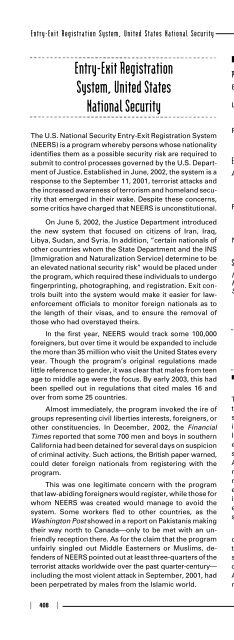ENCYCLOPEDIA OF Espionage, Intelligence, and Security Volume ...
ENCYCLOPEDIA OF Espionage, Intelligence, and Security Volume ...
ENCYCLOPEDIA OF Espionage, Intelligence, and Security Volume ...
You also want an ePaper? Increase the reach of your titles
YUMPU automatically turns print PDFs into web optimized ePapers that Google loves.
Entry-Exit Registration System, United States National <strong>Security</strong>Entry-Exit RegistrationSystem, United StatesNational <strong>Security</strong>The U.S. National <strong>Security</strong> Entry-Exit Registration System(NEERS) is a program whereby persons whose nationalityidentifies them as a possible security risk are required tosubmit to control processes governed by the U.S. Departmentof Justice. Established in June, 2002, the system is aresponse to the September 11, 2001, terrorist attacks <strong>and</strong>the increased awareness of terrorism <strong>and</strong> homel<strong>and</strong> securitythat emerged in their wake. Despite these concerns,some critics have charged that NEERS is unconstitutional.On June 5, 2002, the Justice Department introducedthe new system that focused on citizens of Iran, Iraq,Libya, Sudan, <strong>and</strong> Syria. In addition, “certain nationals ofother countries whom the State Department <strong>and</strong> the INS[Immigration <strong>and</strong> Naturalization Service] determine to bean elevated national security risk” would be placed underthe program, which required these individuals to undergofingerprinting, photographing, <strong>and</strong> registration. Exit controlsbuilt into the system would make it easier for lawenforcementofficials to monitor foreign nationals as tothe length of their visas, <strong>and</strong> to ensure the removal ofthose who had overstayed theirs.In the first year, NEERS would track some 100,000foreigners, but over time it would be exp<strong>and</strong>ed to includethe more than 35 million who visit the United States everyyear. Though the program’s original regulations madelittle reference to gender, it was clear that males from teenage to middle age were the focus. By early 2003, this hadbeen spelled out in regulations that cited males 16 <strong>and</strong>over from some 25 countries.Almost immediately, the program invoked the ire ofgroups representing civil liberties interests, foreigners, orother constituencies. In December, 2002, the FinancialTimes reported that some 700 men <strong>and</strong> boys in southernCalifornia had been detained for several days on suspicionof criminal activity. Such actions, the British paper warned,could deter foreign nationals from registering with theprogram.This was one legitimate concern with the programthat law-abiding foreigners would register, while those forwhom NEERS was created would manage to avoid thesystem. Some workers fled to other countries, as theWashington Post showed in a report on Pakistanis makingtheir way north to Canada—only to be met with an unfriendlyreception there. As for the claim that the programunfairly singled out Middle Easterners or Muslims, defendersof NEERS pointed out at least three-quarters of theterrorist attacks worldwide over the past quarter-century—including the most violent attack in September, 2001, hadbeen perpetrated by males from the Islamic world.❚ FURTHER READING:PERIODICALS:Brown, DeNeen L. “Pakistanis Find Cool Reception inCanada.” Washington Post. (March 19, 2003): A24.Lardner, George, Jr. “Congress Funds INS RegistrationSystem but Dem<strong>and</strong>s Details.” Washington Post. (February15, 2003): A18.Parkes, Christopher. “Anti-Terror Programme in U.S. Runsinto Controversy.” Financial Times. (December 20,2002): 8.ELECTRONIC:Attorney General Prepared Remarks on the National <strong>Security</strong>Entry-Exit Registration System. U.S. Departmentof Justice. (March 24, 2003).Fact Sheet: National <strong>Security</strong> Entry-Exit Registration System.U.S. Department of State International InformationPrograms. (March 24, 2003).National <strong>Security</strong> Entry-Exit Registration System (NEERS). (March 24, 2003).SEE ALSOINS (United States Immigration <strong>and</strong> Naturalization Service)ProfilingSeptember 11 Terrorist Attacks on the United StatesEnvironmental Issues Impacton <strong>Security</strong>❚ WILLIAM C. HANEBERGThe relationship between environmental issues <strong>and</strong> nationalsecurity includes the possibility of conflict overscarce resources such as fresh water <strong>and</strong> arable l<strong>and</strong>, theinfluence of global climate changes on the types <strong>and</strong>locations of future conflicts, <strong>and</strong> the degree to which theenvironmental consequences of domestic military <strong>and</strong>security activities should be open to public scrutiny.Although there is no st<strong>and</strong>ardized definition, aspects ofnational security that are driven by or that address environmentalissues can be collectively described by the termenvironmental security. Because environmental securityissues are tied as closely to public policy, politics, <strong>and</strong>economics as they are to science <strong>and</strong> engineering, discussionsof either are often contentious <strong>and</strong> highly polarized.Increasing concerns about environmental quality <strong>and</strong>degradation during the past several decades have led tothe incorporation of environmental elements into nationalsecurity policy. Some policy scenarios, for example, discussthe possibility of United States troops invading SouthAmerican countries to enforce bans against logging inrainforests or to quell violence arising from competition408 Encyclopedia of <strong>Espionage</strong>, <strong>Intelligence</strong>, <strong>and</strong> <strong>Security</strong>







![The Big Lie 9-11 and Government Complicity in Mass Murder [PDF]](https://img.yumpu.com/50957077/1/190x245/the-big-lie-9-11-and-government-complicity-in-mass-murder-pdf.jpg?quality=85)








